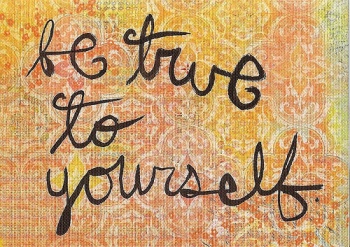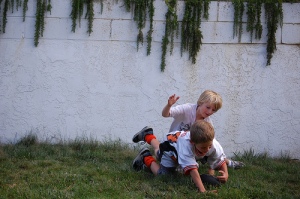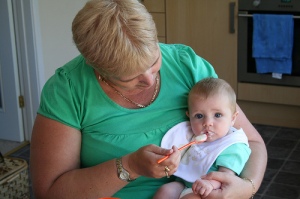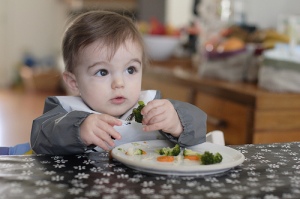With this blog having been running for eighteen months now, I think it’s high time some of our most popular posts are re-posted occasionally for new readers to see more easily. So, by a very long way, here is the most popular post on The Awakened Parent (then Free Your Parenting) to date:
This post is partly inspired by Sarkozy’s ill-considered words last week, and also by a thread I read on Mumsnet by a mother who is sick of breastfeeding her five month old baby who is refusing to take a bottle.
I think the mother is incredibly brave to come out and say what she did. It’s kind of taboo to say ‘I hate breastfeeding’ in a culture where the whole issue is so sensitive and when we’re told repeatedly that ‘breast is best’.
How do we admit that we resent how breastfeeding ties us to our babies when everyone else seems to be loving it?
I have a hunch that most of the issues we have with parenting in our culture, particularly things like post-natal depression, are born from the huge mismatch between our nature and our culture. I first had this situation explained clearly and logically to me in the book I reviewed a couple of weeks ago (which you can also win a copy of) Breastfeeding, Takes Two by Stephanie Casemore.
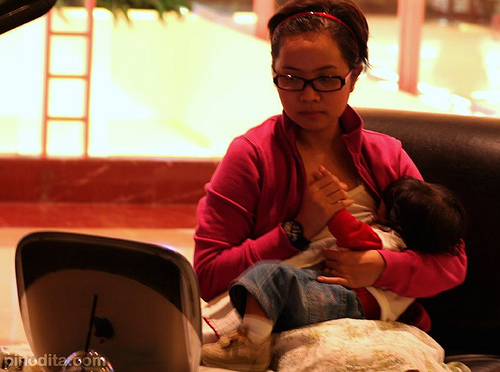 Breastfeeding is natural. Mothers and babies are biologically programmed to have a breastfeeding relationship. It is not breastfeeding that ties us to our babies but nature, because staying close to our babies is also natural.
Breastfeeding is natural. Mothers and babies are biologically programmed to have a breastfeeding relationship. It is not breastfeeding that ties us to our babies but nature, because staying close to our babies is also natural.
Human babies are born far too early compared to other mammals. In order to squeeze their large heads through pelvises that allow us to walk upright, they need to be born at least three months earlier than they should be.
Many people talk nowadays about a ‘fourth trimester’. Consider that our newborns have been held inside us, constantly nourished, never too full, never too hungry, never alone, never in silence for over nine months. And now consider the shock of being born into a world where you are sometimes desperately hungry, sometimes uncomfortably full, sometimes left alone with no human contact, and, for some babies, occasionally left alone in a room that is silent.
Newborn human babies need time to adjust to being outside the womb, and it’s usually at least the first three months (hence the phrase ‘the fourth trimester’). Many parents will recognise that this is the time their babies start to ‘wake up’ and become more interested in the outside world. Before that point, their whole world is Mummy, and that’s how they’re set up biologically to live.
Babies don’t become clingy and tied to their Mum because their Mums keep them close, they are biologically programmed to be clingy and tied to their Mum. It is normal human baby behaviour.
It is not normal in our culture, however, to allow this to happen. For over a century we have been told by baby ‘experts’ to train our babies to be independent from us as early as possible. To train them to be able to fall asleep, and stay asleep, apart from us. To be with other adults without being distressed – or even to just be alone without being distressed.
We are told we need to send our children to nursery in order to learn how to socialise, and to school in order to learn how to live. It’s as if the ‘experts’ believe that eighteen year olds will still need to be breastfed and sleep with their parents if they’re not forced to learn how to be self-sufficient by the age of eighteen weeks!
But this simply isn’t the case. You can trust your baby to become an independent adult one day, but that’s easier said than done when we parent in a culture that doesn’t trust in that process at all.
And that is the crux of the painful feelings that many mothers experience – the mismatch between what our bodies and our babies bodies are telling us, and what our culture is telling us. In addition, we live in a culture that doesn’t respect or value children, mothers or families.
Children are expected to be separate from every day life, and so are mothers. Consider the media bashing Louise Mensch got when she dared to let her work as a mother come into her work as an MP recently. Our culture says that children should not impact on the rest of our lives…or on anyone else’s lives.
 This is incredibly isolating for mothers, particularly those who choose to stay close to their babies. Those mothers who take this approach in our culture risk not only their careers, but also their sanity. We are few and far between – I remember vividly the weeks when most of my Mummy friends started to go back to work, and I felt more and more alone and isolated – and that is not very conducive to happy, contented parenting.
This is incredibly isolating for mothers, particularly those who choose to stay close to their babies. Those mothers who take this approach in our culture risk not only their careers, but also their sanity. We are few and far between – I remember vividly the weeks when most of my Mummy friends started to go back to work, and I felt more and more alone and isolated – and that is not very conducive to happy, contented parenting.
And worse, even if we are lucky enough to find a support network of mothers who also have chosen to stay close to their babies and allow them to grow up in their own time, some of us are weighed down by the terrible feelings of entrapment. Once we’ve made this decision, for many of us that is it – the choice is made and we cannot go back.
Like the Mumsnet mother who said that she has no choice about breastfeeding now that her baby won’t take bottles, the feeling of having no option can be incredibly stifling. Even if we know deep down that we would choose this approach had we the opportunity to make a choice, for some of us, the knowledge that we are now effectively trapped in this role can make it unbearable.
It’s easy to blame breastfeeding for this feeling of enslavement, but it’s not that at all. If this is you, I can categorically say that you haven’t ‘made a rod for your own back’. It is likely that your babies will grow up secure and happy and all this hard work will pay off in the end. It is nothing you’ve done that has created this situation – your baby is simply behaving normally. It is our culture that behaves abnormally, and our culture that has created this situation for you.
Imagine living in a culture where children were not segregated but were, instead, welcomed as full members of society. Imagine working in jobs where babies can come with you, and toddlers can play around your feet while you work. Imagine mothers being valued and celebrated. Imagine a society that did what it could to make life easier for mothers – sharing child-caring duties, large groups of children of different ages who play with and learn from each other, children who are enabled to learn about the adult world by living in it.
Can you see that if you lived in a more natural culture like this, breastfeeding wouldn’t be a tie at all? You would simply keep your baby in a sling, get on with your life, and feed your baby whenever she needed it with very little disruption to you. And when you needed a break from your baby (which you probably wouldn’t), your baby would have been brought up spending so much time around other adults and children that it is likely he’d be more than happy to be held by someone else for short periods of time…so long as that separation is managed by him, not you.
Can you see that if you lived in this culture, it wouldn’t be unacceptable to say ‘sorry, I can’t do this job just this moment because my children need me’? Instead, if you said that, everyone else would say ‘of course! We adults can wait because we have learnt that, and children can’t – see to your child and then we can talk’.
So breastfeeding and responsive parenting isn’t a tie – our culture makes it isolating and solitary, hard work. But how on earth do we do it, then, if we feel it’s the right thing for us and our babies but we live in this bizarre culture?
 The best thing I can suggest if you are one of the mums who is feeling this way, is that you seek out other parents who are parenting in the same way you are, and talk to them honestly. When this woman posted on Mumsnet, she expected a bashing, instead, however, she got a rush of other mothers telling her they could totally relate. The next day the original poster said she was feeling much better and it had just been a bad patch. Bad patches are normal, but they’re scary when we have to live through them on our own, so tell people, and let them hold you through it.
The best thing I can suggest if you are one of the mums who is feeling this way, is that you seek out other parents who are parenting in the same way you are, and talk to them honestly. When this woman posted on Mumsnet, she expected a bashing, instead, however, she got a rush of other mothers telling her they could totally relate. The next day the original poster said she was feeling much better and it had just been a bad patch. Bad patches are normal, but they’re scary when we have to live through them on our own, so tell people, and let them hold you through it.
Having a support network around you can also help with things like sharing parenting – visiting places together takes the pressure off you, and someone else can help your toddler do up her coat while you breastfeed your baby so you don’t have to get flustered trying to decide which thing to do first.
It’s not helpful to choose support that consists of people who will tell you just to put your baby in nursery, or to wean them off the breast if that is what is important to you, so be prepared with what to say to people who suggest that. Tell them exactly what help you need – a listening ear? an acknowledgement of how hard you’re finding it? practical help like doing your laundry for a couple of weeks?
I’m not going to suggest that you all home educate, but I’d like to share my experience of the home education community, because it’s so interesting. What I’ve found is that a lot of home educators (not all) practice what they call ‘attachment parenting’, but even if they don’t, they are very sympathetic to the very particular demands of being on hand for your babies or children all day every day.
Having my later babies, having already become friends by that point with many other home educators, was much easier than having my first two. I would go along to busy home ed groups, and I would see one of my older children being helped by another adult or an even older child – she didn’t feel such a need to come to me because she was comfortable with these other people.
Someone would always step in to hold my baby while I went to the loo or changed a toddler’s nappy, but if my baby screamed, instead of saying ‘oh, she’ll be fine’, they’d hand her back and say ‘I’ll do the nappy for you’. These whole aftern0on-long home ed groups became a real refuge for me – relaxing, fun, and like what parenting in a community should be like. I would drive home with a heart that felt heavier with each mile, knowing I had two more hours alone with my children before my husband came home.
So you’re not alone if you find breastfeeding, or any aspect of close, responsive parenting stifling and frightening. You’re normal and not struggling with mothering but with mothering in our culture. And your baby isn’t being clingy because of anything you’ve done, but because he’s normal, and you’re expecting him to behave in the way our culture tells us babies behave…which isn’t normal. (Also, check out the bottom of this post, where I talk about the cycle of insecurity)
So find a support network, and be honest about your feelings is my suggestion for how to survive if you choose to breastfeed and/or to parent in this close, responsive way.
I’d love to hear your experiences of feeling trapped by breastfeeding or close, responsive parenting and how you dealt with it.
Images: Pinot & Dita, JMaz Photo & Brighton Sling Babies, Flickr
Edited: I’ve just changed a few sentences to make it clearer that not all mothers feel so oppressed like this. I had tried to be careful with that anyway, as I always am, but I have just adjusted a handful of sentences to make it even more clear :)


